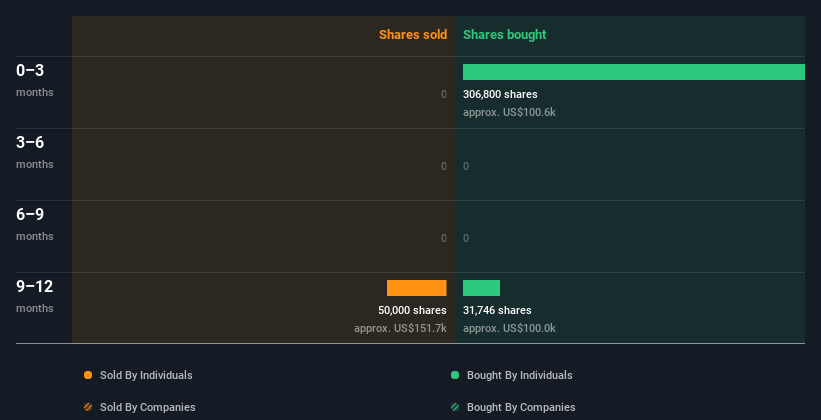Insider Buyers Lose US$73k As Intrusion Sheds US$1.3m
The recent price decline of 12% in Intrusion Inc.'s (NASDAQ:INTZ) stock may have disappointed insiders who bought US$201.7k worth of shares at an average price of US$0.60 in the past 12 months. Insiders buy with the expectation to see their investments rise in value over a period of time. However, recent losses have rendered their above investment worth US$128.8k which is not ideal.
Although we don't think shareholders should simply follow insider transactions, logic dictates you should pay some attention to whether insiders are buying or selling shares.
See our latest analysis for Intrusion
Intrusion Insider Transactions Over The Last Year
The Co-Founder & CTO, T. Head, made the biggest insider sale in the last 12 months. That single transaction was for US$120k worth of shares at a price of US$3.35 each. While insider selling is a negative, to us, it is more negative if the shares are sold at a lower price. The silver lining is that this sell-down took place above the latest price (US$0.38). So it may not tell us anything about how insiders feel about the current share price. The only individual insider seller over the last year was T. Head.
Over the last year, we can see that insiders have bought 338.55k shares worth US$202k. On the other hand they divested 50.00k shares, for US$154k. In the last twelve months there was more buying than selling by Intrusion insiders. They paid about US$0.60 on average. I'd consider this a positive as it suggests insiders see value at around the current price. You can see the insider transactions (by companies and individuals) over the last year depicted in the chart below. If you want to know exactly who sold, for how much, and when, simply click on the graph below!
There are always plenty of stocks that insiders are buying. So if that suits your style you could check each stock one by one or you could take a look at this free list of companies. (Hint: insiders have been buying them).
Insiders At Intrusion Have Bought Stock Recently
It's good to see that Intrusion insiders have made notable investments in the company's shares. insider Raymond Hyer spent US$102k on stock, and there wasn't any selling. This is a positive in our book as it implies some confidence.
Insider Ownership
For a common shareholder, it is worth checking how many shares are held by company insiders. Usually, the higher the insider ownership, the more likely it is that insiders will be incentivised to build the company for the long term. It appears that Intrusion insiders own 31% of the company, worth about US$2.9m. While this is a strong but not outstanding level of insider ownership, it's enough to indicate some alignment between management and smaller shareholders.
What Might The Insider Transactions At Intrusion Tell Us?
The recent insider purchase is heartening. We also take confidence from the longer term picture of insider transactions. However, we note that the company didn't make a profit over the last twelve months, which makes us cautious. Insiders likely see value in Intrusion shares, given these transactions (along with notable insider ownership of the company). While we like knowing what's going on with the insider's ownership and transactions, we make sure to also consider what risks are facing a stock before making any investment decision. At Simply Wall St, we've found that Intrusion has 6 warning signs (4 are potentially serious!) that deserve your attention before going any further with your analysis.
But note: Intrusion may not be the best stock to buy. So take a peek at this free list of interesting companies with high ROE and low debt.
For the purposes of this article, insiders are those individuals who report their transactions to the relevant regulatory body. We currently account for open market transactions and private dispositions of direct interests only, but not derivative transactions or indirect interests.
Have feedback on this article? Concerned about the content? Get in touch with us directly. Alternatively, email editorial-team (at) simplywallst.com.
This article by Simply Wall St is general in nature. We provide commentary based on historical data and analyst forecasts only using an unbiased methodology and our articles are not intended to be financial advice. It does not constitute a recommendation to buy or sell any stock, and does not take account of your objectives, or your financial situation. We aim to bring you long-term focused analysis driven by fundamental data. Note that our analysis may not factor in the latest price-sensitive company announcements or qualitative material. Simply Wall St has no position in any stocks mentioned.

